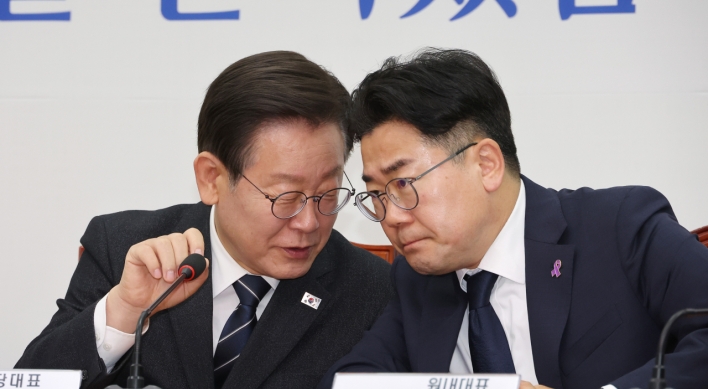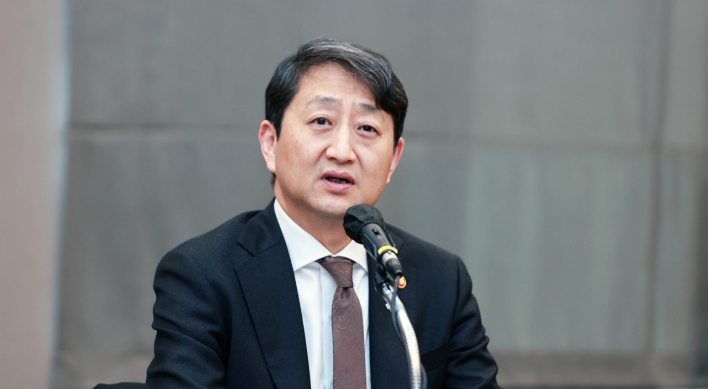The ruling Saenuri Party’s leading presidential hopeful Rep. Park Geun-hye said Monday she was open to holding inter-Korean summit talks with North Korea’s new leader Kim Jong-un as part of her confidence-building policy for Pyongyang.
“I am open to holding the summit talks if I should get a chance (as president). I deem that it is always positive to hold dialogue with the North,” Park said during a debate hosted by the Korea News Editors’ Association at Korea Press Center in downtown Seoul.
“Nobody would be able to ascertain how the North Korean system will turn out, or whether Kim Jong-un has taken hold of control,” Park said of the reclusive state.
Park had met Kim Jong-un’s father and deceased ruler Kim Jong-il in May 2002 upon the North’s invitation.
The presidential frontrunner has proposed a “confidence-building process” as the main facet of her North Korean policies in her declaration of the presidential bid on July 10. The proposal, reportedly designed by former members of the progressive Roh Moo-hyun government, was seen as an effort to differentiate from the rigid policy held by the incumbent Lee Myung-bak administration.
According to her platform, Park would uphold existing agreements between the two Koreas and between Pyongyang and the international community, as well as consistent humanitarian and mutual exchanges unbound by political situations, and aims to expand and diversify economic cooperation.
“I am open to holding the summit talks if I should get a chance (as president). I deem that it is always positive to hold dialogue with the North,” Park said during a debate hosted by the Korea News Editors’ Association at Korea Press Center in downtown Seoul.
“Nobody would be able to ascertain how the North Korean system will turn out, or whether Kim Jong-un has taken hold of control,” Park said of the reclusive state.
Park had met Kim Jong-un’s father and deceased ruler Kim Jong-il in May 2002 upon the North’s invitation.
The presidential frontrunner has proposed a “confidence-building process” as the main facet of her North Korean policies in her declaration of the presidential bid on July 10. The proposal, reportedly designed by former members of the progressive Roh Moo-hyun government, was seen as an effort to differentiate from the rigid policy held by the incumbent Lee Myung-bak administration.
According to her platform, Park would uphold existing agreements between the two Koreas and between Pyongyang and the international community, as well as consistent humanitarian and mutual exchanges unbound by political situations, and aims to expand and diversify economic cooperation.

“I believe the matter of resuming Mount Geumgang tours is helpful to building confidence between the two Koreas,” Park said. But she preconditioned it with North Korea’s promise to prevent any reoccurrences of a security threat to South Korean civilians. The flagship inter-Korean tour project was suspended after a fatal shooting in 2008 of a South Korean civilian near the resort by a North Korean soldier.
Park also said she hoped to see the reunion of separated families continue regardless of changing political situations.
During the approximately 90-minute-long debate joined by political editors of South Korea’s leading media companies, the former chairwoman answered questions ranging from partisan issues to her economic policies.
To a question on the recent controversy surrounding the National Assembly’s rejection last week of the prosecutorial request to arrest Saenuri Party lawmaker Chung Doo-un, Park said she made the mistake of trusting “100 percent” that her colleagues would approve the arrest. Park did not attend the vote. The votes on the arrest motion were considered to be a barometer of the new parliament’s commitment to reform by throwing away their privileges.
“I never imagined that the motion for arrest would not pass the parliamentary vote,” Park said. The leadership’s decision later to urge Rep. Chung to take responsibility of the veto ― which invited burden on Park’s political reform drive ― prompted internal protest from the reformative members. They said the party was excessively loyal to Park and her presidential campaign at the cost of party’s democracy.
She retorted that such criticism deviated from the essence of the problem and once again urged Rep. Chung to take responsible measures.
Park, in the meantime, reiterated her support for her late father President Park Chung-hee and his dictatorial rule of the country in the 1960s and ‘70s.
“I assume that my deceased father made the best possible choice he could for the country at the time, which was not only perhaps the second-poorest country in the world but was also facing an extremely dangerous security crisis,” Park said of the contentious evaluation of the May 16 military coup led by Park Chung-hee.
“I believe that it was the right decision based on how ‘May 16’ established the foundation of Korea’s development,” Park said. She, however, said she apologizes to the people and their families who suffered through the process.
Arguments persist over how to review Park Chung-hee’s leadership with the assessments sharply divided between the conservatives and progressives. While the conservatives claim Park’s rule attributed to Korea’s epochal economic growth, the progressives call the coup one of the most tragic events in Korea’s history that destroyed the chance of introducing democracy faster.
Regarding economy, Park underscored her determination to crack down on conglomerates’ abuse of economic power but opposed taking measures to dissolve the chaebol completely.
By Lee Joo-hee (jhl@heraldcorp.com)
-
Articles by Korea Herald



![[AtoZ Korean Mind] Does your job define who you are? Should it?](http://res.heraldm.com/phpwas/restmb_idxmake.php?idx=644&simg=/content/image/2024/05/06/20240506050099_0.jpg&u=)















![[K-pop's dilemma] Is Hybe-Ador conflict a case of growing pains?](http://res.heraldm.com/phpwas/restmb_idxmake.php?idx=642&simg=/content/image/2024/05/07/20240507050746_0.jpg&u=)